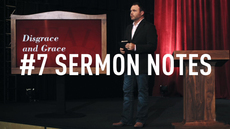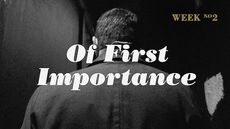From the February 12 sermon “Taking Out the Trash”, preached by Pastor Mark Driscoll:
Every house—like any relationship, particularly a marriage—has trash that must be taken out. You’re going to sin against each other. Trash is going to accumulate. If you don’t take out the trash, it will stink up the whole relationship. Don’t fight with criticism, contempt, defensiveness, or stonewalling. Rather, fight to the glory of God by recognizing sin and repenting of sin. Repentance is three things: confession, contrition, and change. It takes a sinner to repent. It takes a victim to forgive. It takes two people to reconcile. The only way your relationship will be enduring and endearing is if repentance of sin and forgiveness of sin are practiced; otherwise, it will not get better, it will get bitter.
And so at Mars Hill, it’s really important that you know that we use the language of sin because that’s the language the Bible uses. It’s not just a moral failure or a mistake. It’s a sin, and that means it not only is implicating and affecting the person that we’re in relationship with, it also includes God. It includes the Lord. Because when we sin, we sin against the Lord. That’s what the psalmist says. “Against you only,” Lord God, have I sinned.” And we sin against the person we’re in relationship with. And this is what distinguishes Christian relationships from all other relationships. . . .
Here’s the big idea: if you’ve done bad, feel bad; otherwise, you’re a sociopath, right? We don’t want you to say, “I did bad, but I feel good.” Well, okay, then you have some serious issues. Sometimes we feel bad, because we’ve done bad. And what that is, that’s not condemnation. "There is now no condemnation for those who are in Christ.” It’s conviction. It’s the Holy Spirit showing us our sin, not to destroy us, but to motivate us to destroy the sin before it destroys the relationship.
The Protestant Reformation was kicked off with basically a manifesto called, “The 95 Theses” that was penned by Martin Luther, and it was nailed to this door at a place called Wittenberg, and it began this manifesto with this statement: “All of a Christian’s life is one of repentance.” You repent of sin to become a Christian. You repent of sin to grow as a Christian. You repent of sin to reveal Christ to others. All of a Christian’s life is one of repentance. The prophets keep saying, “Repent, repent, repent.” And repentance is three things. It’s confession, it’s contrition, and it’s change. . . .
Confession is your mind and your mouth. Contrition is ultimately inclusive of your emotions and your expressions. Somebody who is really contrite, they not only know categorically that they have done wrong, but they feel emotionally that they’ve done wrong. You feel it. . . .
So, it is conviction, it is contrition, and it is change, and change, that’s your will and your works. By the power of the Holy Spirit, you say, "I don’t want to do that anymore. "I don’t want to say that anymore. "I don’t want to be like that anymore. “I want to be like Jesus. I want to get beyond this. I want this to die, since Jesus died for it. I want to put it to death.” And ultimately, by the grace of God, through the power of the Holy Spirit, you change. You stop doing that. You stop being like that. And maybe it’s all at once, and it’s radical. Maybe you have some failures along the way, but you repent and come clean, and you seek the help that you need, and you confess it to your spouse, and you ask for prayer, and by the grace of God, you do change.
The Bible says that life and death are held by the power of the tongue. You could bring life or death to that relationship by the words you choose, and the Holy Spirit wants you to have truthful words, not lying words, but words that are gracious, words that are life giving, not death causing. . . .
And if you don’t, here’s what happens: bitterness. Bitterness. See, the sinner is supposed to repent of sin; the victim of sin is supposed to forgive. And if the victim of sin does not forgive, you become bitter. All you need to do to become bitter is not forgive. . . .
And all of that’s a denial of the gospel of Jesus Christ. “Well, didn’t he suffer? Wasn’t he shamed? Didn’t he die? Hasn’t he already paid?” “Yes, but that’s not enough. I’m going to make them pay, as well.” And that’s what bitter people do. Relationships, marriages, they invariably get bitter, or they get better.
It’s really a change of theology and how we view God. And it usually contributes to a false gospel, meaning, "I know Jesus suffered, but I need to suffer, too. I know Jesus was shamed, but I need to be ashamed, too. I know that Jesus wept, but I need to weep, too. I know that Jesus was rejected, but I need to be rejected, too.” And what it’s saying is, “Jesus, I really appreciate it, but that wasn’t quite enough.” And what it’s saying is, "Jesus, I know you forgive me, "and I know you’re the Lord, "but above you there’s another lord: me. “And though you would forgive me, I don’t forgive myself, because I’m the highest lord in my life.” . . .
So, for those of you who are now hearing this, you need to do something with it. Are you a Christian? Have you ever repented of your sin to Jesus and received his forgiveness? If not, you need to do that. Become a new person, not just a better person, but a new person. . . .
The final word is not condemnation, but salvation. Jesus didn’t just die—he also rose, and he hears prayer. He forgives sin. He reconciles people to himself and one another. And as we sing, that’s what we celebrate.
Next week, part 6: “Sex: God, Gross, or Gift?”














